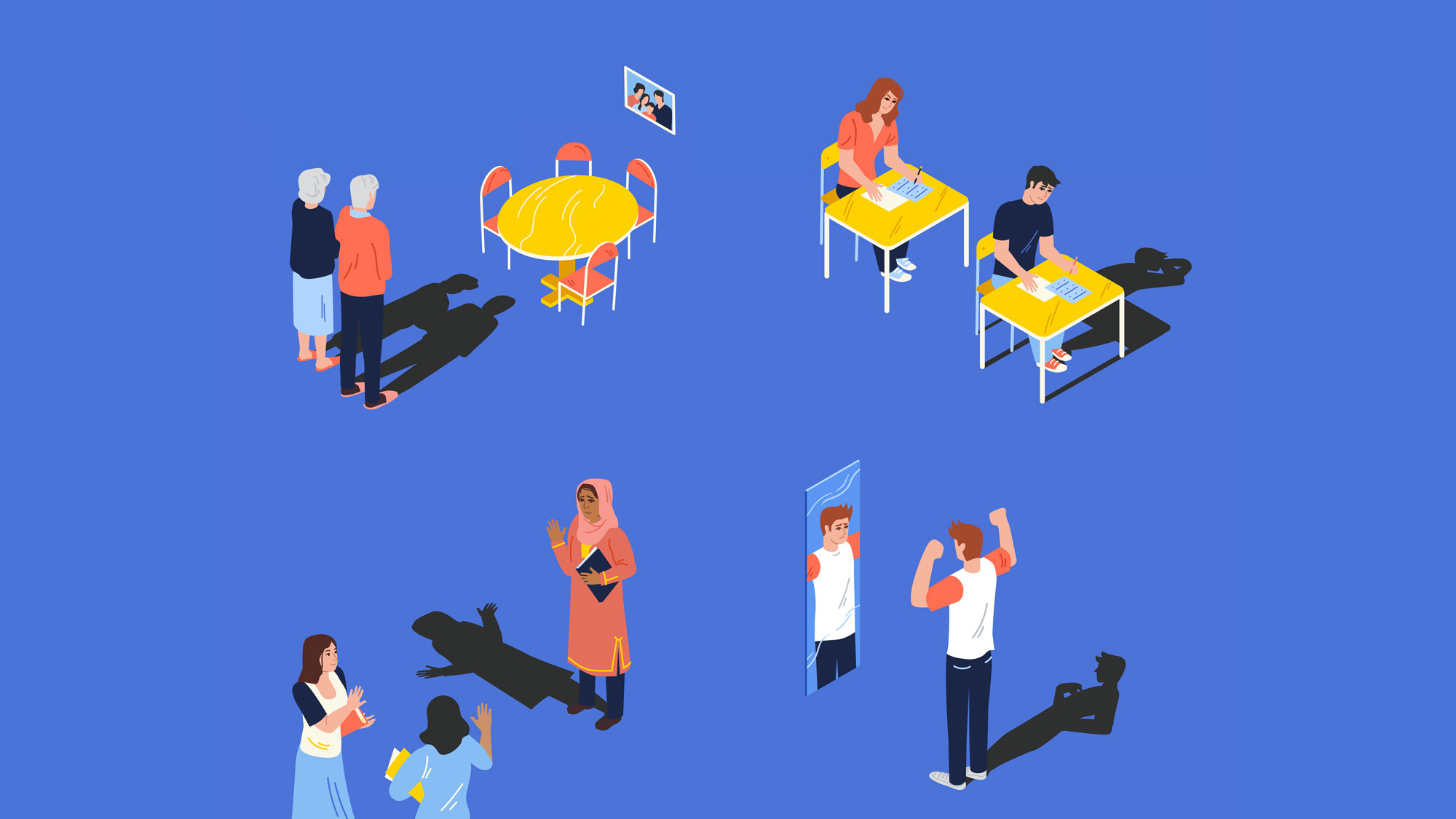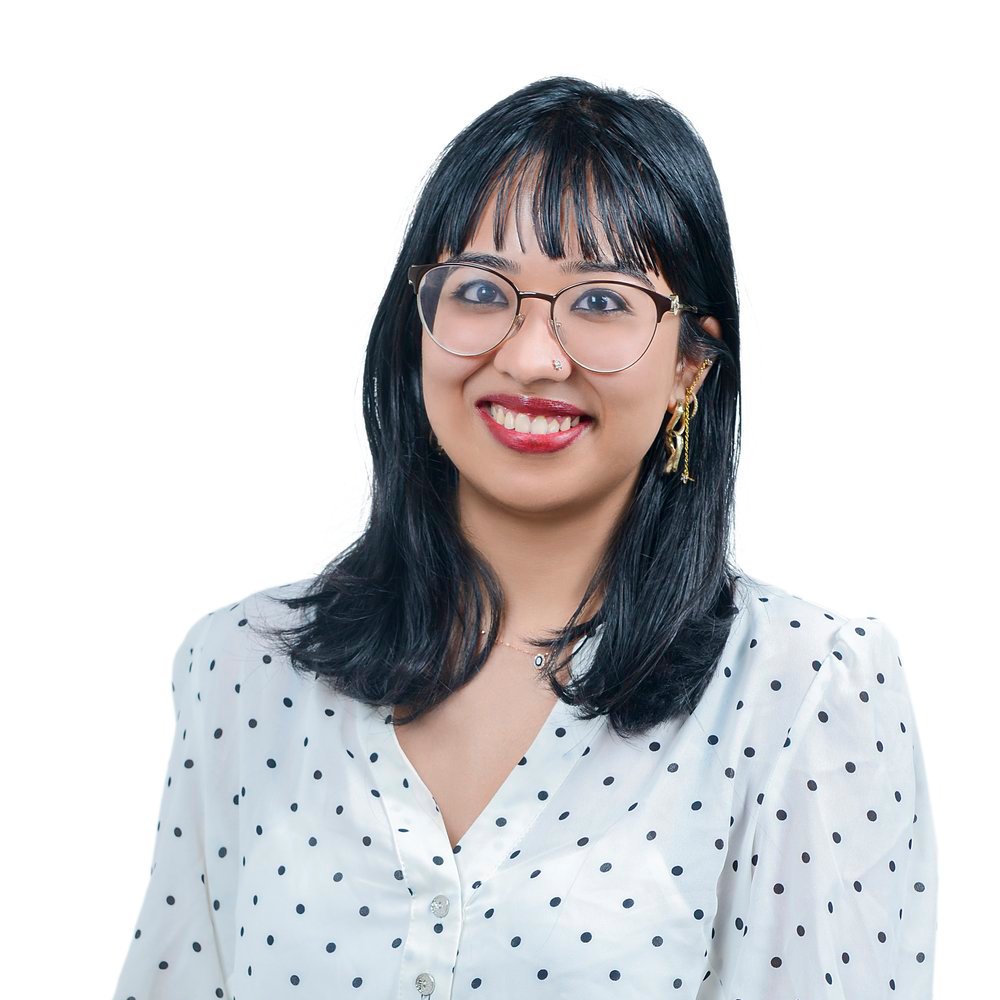
What is anxiety?
We all get anxious sometimes. People with anxiety disorders have intensive, excessive, and persistent worry and fear about everyday situations. There are many types of anxiety disorders including generalized anxiety disorder, panic attacks, social anxiety disorder (social phobia), and specific phobias. Globally, anxiety disorders are the most common of all mental disorders, affecting 1 in 6 adults (World Health Organization, 2019). In the UAE anxiety disorders affect 1 in 5 people (20% of the population). Amongst these, Generalized Anxiety Disorder is the most common anxiety disorder in adults.

“Having suffered with anxiety for many years and trying lots of self help techniques to manage it by myself, I finally reached out to Thrive Wellbeing Centre to start a course of CBT to try and get some practical everyday help that could guide me through my anxiety.”

Some common symptoms of anxiety include:
Feeling nervous, restless, or tense
Difficulty sleeping
Having difficulty controlling worry
Physical symptoms, such as increased heart rate, rapid breathing, sweating, and trembling
Trouble concentrating or thinking about anything other than the present worry
Having the urge to avoid things that trigger anxiety
Many people experience these anxiety symptoms without being anxious. You might be anxious if these symptoms persist for two or more weeks, and are not caused by a clear trigger such as death of a loved one, substance use, or health issues.

Get in touch to find out how we can help you overcome your anxiety. Contact us however you feel most comfortable, for example Whatsapp message us, or feel free to call us on +971 56 895 2347. You can also email or simply send us a query via our online form. Instagram message, Facebook chat… whatever works best for you!
Our goal is to make you comfortable.

What does Anxiety Look Like?

What can I do right now to help with my anxiety?
The first step is to just breathe. Read more about how breathing affects our feelings. You can also check out our resources for relaxed breathing and progressive muscle relaxation.
Are there different types of anxiety?
There are several types of anxiety, and their intensity can range from mild to severe. The following is a basic guide to some of the different forms of anxiety. For more information, we recommend visiting the Mayo Clinic website.
1. Generalized Anxiety Disorder (GAD).
People who are struggling with generalized anxiety disorder experience persistent and excessive worry about everyday life events. For example, someone with generalized anxiety disorder will spend a lot of time worrying about things like their school or work life, family relationships, friendships, physical health, and finances. Often, they will expect the worst-case scenario and ruminate over these negative thoughts. Typically, this form of anxiety is described as either mild, moderate, or severe. We offer several generalized anxiety treatment options at Thrive, all of which are evidence-based and effective. Please see below for more information and click here to read what some of our past clients have said about working with us. GAD is the most common anxiety disorder.
2. Panic disorder.
People with panic disorder experience very sudden and strong feelings of anxiety, fear, or terror. These feelings tend to peak within a few minutes and are known as panic attacks. A panic attack is usually marked by a number of physical symptoms including accelerated heart rate (heart palpitations), sweating, shortness of breath, chest pain, and nausea. Often, people who experience panic attacks worry about experiencing them again and will go out of their way to avoid situations/places in which they’ve previously occurred. Struggling with panic attacks? Check out our blog on how to stop them in their tracks.
3. Social Anxiety Disorder.
People who are struggling with social anxiety disorder (also known as social phobia) experience high levels of anxiety and fear when there is a chance that they will be scrutinized by others. This can include interacting with others (e.g., meeting new people), being observed by others (e.g., eating or drinking in front of people), and performing in front of others (e.g., giving a presentation or a speech). People with social anxiety disorder will go out of their way to avoid these situations and the related self-consciousness and embarrassment.
4. Illness Anxiety Disorder.
Commonly known as health anxiety, this disorder is actually characterized as a Somatic Symptom and Related Disorder. People with illness anxiety disorder experience persistent worry about their physical health status and become preoccupied with either having or acquiring a serious illness. This can also lead to reassurance (e.g., excessive Googling or medical check-ups) and physical checking (e.g., constantly checking their body for signs of an illness), all of which reinforce the preoccupation with the physical health status. You can read more about what health anxiety is and how it works on our blog.
5. Separation Anxiety Disorder.
People with separation anxiety disorder experience significant fear or anxiety concerning separation from an attachment figure, such as a parent or romantic partner. For example, someone with separation anxiety disorder will struggle with the thought of being away from the attachment figure. Sometimes, this means that they will be reluctant to or refuse to be away from them. Other times, it can mean that they have repeated nightmares about separation and complain about physical symptoms either when the separation occurs or just by thinking about it.
6. Specific Phobias.
People with specific phobias experience fear or anxiety about a particular object or situation. As a result, people will go out of their way to avoid coming into contact with the phobic object/situation (i.e., the stimulus that they have a phobia towards). Phobias can lead to panic attacks for some people. Common phobias include arachnophobia (excessive fear of spiders), ophidiophobia (excessive fear of snakes), acrophobia (excessive fear of heights), aerophobia (excessive fear of flying), cynophobia (excessive fear of dogs), astraphobia (excessive fear of thunder and lightning), trypanophobia (excessive fear of injections), social phobia (excessive fear of social situations), agoraphobia (excessive fear of being alone in a place or situation from which it may be difficult to escape), and mysophobia (excessive fear of germs and dirt).
Other types of anxiety disorders not covered here include:
Selective mutism
Agoraphobia
Anxiety disorder due to another medical condition
Other specified anxiety disorder
Unspecified anxiety disorder
What causes anxiety?
Anxiety is widespread. Similar to depression, women experience it almost twice as much as men; although men are less likely to reach out for help and usually when they do it’s more severe.
There are many factors that are linked to anxiety. Some of the contributors are:
1. Biological factors.
Research shows that some people are more likely to experience anxiety based on their biological profile. Anxiety is linked to certain genes, temperaments, brain activity, and neurotransmitters.
2. Learning
We can learn anxiety in multiple ways. One way is through observational learning. This means that we can develop a fear by seeing someone close to us avoid or react to a fear-producing object. For example, seeing your caregiver have very strong fear reactions to spiders in childhood could prompt you to develop arachnophobia.
Another way we can learn anxiety is through conditioning. One type of conditioning is classical conditioning, which means that we develop an association between two things over time. A classic example is 9-month-old Little Albert, who was conditioned to associate a white mouse with a very distressing sound. Overtime, Little Albert developed a fear of white mice and experienced a lot of distress when he would see one. This response was overgeneralized to other white and fluffy objects, including socks, bunny rabbits, and cotton balls.
Operant conditioning occurs when consequences shape our behavior. In terms of anxiety, we often make the decision to leave an anxiety-provoking situation. This usually results in a reduction of the anxiety which then reinforces our behavior in the future. For example, imagine that you had a panic attack in a supermarket and now experience anxiety every time you have to go to a supermarket. Many people will then avoid going to the supermarket, which reduces their anxiety in the short-run but maintains their anxiety in the long-run.
3. Psychological factors
Anxiety can also be triggered by our experiences. Research shows that people who were abused, experience significant life stress, and/or had overprotective parents are at a heightened risk for developing certain anxiety disorders.
Does any of this sound familiar?
Just remember - the most important thing is to be aware of, and recognize, the symptoms of anxiety and seek professional, licensed support using evidence-based effective treatments.
How is anxiety treated at Thrive?
We offer several different treatment options at Thrive.
1. Cognitive behavioral therapy (CBT)
Cognitive behavioral therapy (CBT) is a widely used type of talk therapy (psychotherapy), common for mental health. CBT is an evidence-based treatment, which means that it has been shown to be effective through clinical trials. This CBT anxiety therapy is evidenced based - conducted by professionals in Dubai. During the session, a CBT practitioner will work with you to identify the link between how you think, feel, and behave. We then work on changing these unhealthy and unhelpful patterns. The sessions are very structured and you will be given tasks between sessions to practice different skills. Ultimately, our goal is to make ourselves redundant by working with you to identify the coping strategies you need to manage on your own. Typically, we see clients for between four to twelve sessions.
2. Integrative psychotherapy
There are many different therapeutic approaches: cognitive behavioral therapies, psychoanalysis and psychodynamic therapies, and humanistic and existential therapies. In addition to CBT, we offer holistic therapy. This means that we draw from different approaches based on our clients’ needs.
Sonia Singhal (M.Ed., M.A., LMFT) is an integrative psychotherapists. Their approach is generally strengths-based, empowerment-driven, and emotion-centered.
3. Art therapy, play therapy, and sandtray therapy
In addition to talk therapy, we offer creative therapies including art therapy, play therapy, and sandtray therapy. These therapeutic modalities are a wonderful alternative, especially when people have difficulty expressing themselves verbally. Children and adolescents, regardless of their creative inclinations/abilities, have a tendency to respond well to these types of therapies. Talk therapy - especially CBT is also incorporated into the sessions.
What do we do during a session?
What we do in a session will depend on the type of treatment that you are getting. CBT is a structured talk therapy session with activities and exercises. Integrative psychotherapy is an unstructured talk therapy session where we explore whatever the client wants to focus on. Art therapy, play therapy, and sandtray therapy will centre on a creative task, but will also incorporate some talk.
Why should you work with us?
We are warm, empathic, experienced and non-judgmental mental health professionals (with the option for English, Arabic, French, and Russian). We combine the latest research and best practice with your goals to give you the best tools for you in our confidential and affordable anxiety therapy sessions.

Thrive Specialists in Anxiety
Dr. Kate Prozeller
Licensed Psychologist
Dr. Kate Prozeller is a CDA-licensed psychologist. She holds her PsyD in Counseling Psychology from Saint Mary’s University in the United States. Dr. Kate provides individual therapy to adults, couples therapy, and English-language art, sand, and play therapy to children and adolescents. Prior to relocating to Dubai in 2019, she has worked as a psychologist in the United States, serving a variety of patient populations and across hospitals, private practice, and university settings.
Pashmi Khare, M.Sc.
Licensed Psychologist
Pashmi Khare is a CDA-licensed psychologist with MSc in Counseling Psychology from Christ University, India and has been practicing for more than 8 years in India and UAE. She provides counseling for adults, adolescents, and couples in English, Hindi, and Urdu. She has a special interest in supporting individuals with fertility issues and PCOS.
Dr. Vassiliki Simoglou
Licensed Psychologist
Dr. Vassiliki Simoglou is a CDA-licensed psychologist. She completed all her studies in Psychology in France, and is a licensed psychologist in Greece and the European territory, and in Dubai by the CDA. Dr. Vassiliki holds a PhD in Psychoanalysis and Psychopathology from Sorbonne Paris Cité - Paris Diderot University in Paris, and a Bachelor’s and Master’s Degree in Clinical Psychology from the University Louis Pasteur of Strasbourg. She also holds a Master’s degree in Psychoanalytic Studies from the University of Essex in the UK. She has been working as a psychodynamically oriented psychotherapist for more than 14 years, in Dubai, Paris and Athens. She offers individual counseling and psychotherapy for adults and adolescents (15+), couples therapy, family therapy, and perinatal and infertility counseling - in French, English and Greek.
Maša Karleuša Valkanou, M.Sc.
Licensed Psychologist
Maša Karleuša Valkanou is a CDA-licensed psychologist in Dubai. As a certified Systemic Family psychotherapist, she works with individual clients, adults or children. She is specialised in work with adolescents. She works with couples, parents or the whole family together. Her work covers various psychological difficulties and background including psychotic disorders, addictions, neurotic disorders (depression, anxiety, panic attacks etc.), psychological trauma, abuse, self-harm, suicidal thoughts and feelings, behavioural, emotional and problems in relationships or family problems.
Dr. Elif Celebi
Licensed Psychologist
Dr. Elif Celebi is a DHA-licensed and US-trained Clinical Psychologist with 12 years of post-qualification experience. She has a particular interest in using mindfulness, emotion regulation and other evidence-based approaches to balance compassion, acceptance and change. Dr. Elif clinical expertise includes working with depression, anxiety, trauma, adjustment/life transitions, grief and loss, borderline personality disorder, and dissociation.
Jessica Rosslee, M.A.
Licensed Psychologist
Jessica Rosslee is a DHA-licensed Clinical Psychologist. She obtained her Master’s degree in Clinical Psychology at the University of the Free State, South Africa, in 2011. Jessica’s clinical interests and extensive expertise cover a broad range of mental health conditions or problematic concerns.
Dr. Marina Hakimian
Licensed Psychologist
Dr. Marina is a CDA-licensed psychologist who specializes in working with children and families. She provides art, play, and sand tray therapy for children as well as psychotherapy for adolescents. Marina also works with parents and adults.
Dr. Diana Cheaib Houry
Licensed Psychologist
Dr. Diana is a CDA-licensed psychologist with a Ph.D. in Psychopathology and Psychoanalysis from the University of Denis-Diderot in France. She has a special interest in women’s health and has dedicated over 10 years to researching and studying women’s discomfort and mental issues and how they relate to culture and identity conflicts. Dr. Diana has a psychodynamic therapeutic orientation, which allows a deep understanding of the difficulties a person can go through.
Cynthia Ghosn
Psychology Technician & Early Career Professional
Cynthia is a DHA-licensed Psychology Technician. She is in the process of completing her Ph.D. in Clinical Psychology at Meridien University in the USA. She works with adolescents and adults who are experiencing anxiety, depression, burnout/stress, life transitions, and relationship issues. Cynthia is part of our Early Career Professional (ECP) program, which means that she works closely under the supervision of Clinical Advising Director, Dr. Chasity O’Connell. In an effort to make therapy more accessible and support the growth and development of clinicians in the field, we are offering an adjusted pricing structure through our ECP program.
Joslin Gracias, M.A.
Licensed Psychologist
Joslin is a CDA-licensed psychologist. She holds an M.A. in Clinical Psychology from S.N.D.T. University in India. Joslin works with adolescents, adults, and couples who are experiencing depression, anxiety, relationship difficulties, trauma, and burnout/stress.
Tuna Bereket, M.A.
Allied Health Counsellor
Tuna is a DHA-licensed allied health counsellor. She obtained her B.A. degree in Psychology and her Master’s degree in Clinical Psychology at SWPS University in Poland. Tuna supports people who are struggling with depression, anxiety, trauma, relationship issues, personality disorders, and bereavement.
Sam Menon
Licensed Psychologist & Early Career Professional
Sam is a DHA-licensed Psychologist. She holds an M.Sc. in Abnormal and Clinical Psychology from Swansea University in the UK. She works with adolescents and adults who are experiencing depression, burnout/stress, and difficulties adjusting to new phases of life (university and workplace). Sam is part of our Early Career Professional (ECP) program, which means that she works closely under the supervision of Clinical Advising Director, Dr. Chasity O’Connell. In an effort to make therapy more accessible and support the growth and development of clinicians in the field, we are offering an adjusted pricing structure through our ECP program.
Zuha Zubair, M.Sc.
Licensed Psychologist
Zuha is a CDA-licensed psychologist. She holds an M.Sc. in Clinical and Abnormal Psychology from Swansea University (UK). She used a client-centered approach deeply rooted in compassion and warmth, tailoring therapeutic aid to each client based on their needs and personality. She has been trained in Cognitive Behavioral Therapy, Dialectical Behavioral Therapy, and Acceptance and Commitment Therapy.
Corina Saramet, M.A.
Licensed Psychologist
Corina is a CDA-licensed psychologist specializing in working with adults and adolescents (16+). She obtained her Master’s Degree in Cognitive Behavioral Psychotherapy at the University Titu Maiorescu in Romania. Her areas of expertise include anxiety disorders, depression, grief and loss, trauma, and stress.
Dr. Dana Jammal
Licensed Psychologist
Dr. Dana is a UK-trained HCPC registered Counselling Psychologist who completed her doctorate training at City, University of London. She also holds a Master of Science degree in Mental Health Studies from the Institute of Psychiatry, Psychology and Neuroscience at King’s College London and a Bachelor of Science Honors degree in Psychology from McGill University in Canada. Dana has over 10 years experience working with individuals facing a range of mental health difficulties and challenges.
Rita Figueiredo, M.Sc.
Licensed Psychologist
Rita Figueiredo is a Clinical and Health Psychologist with an M.Sc. from the University of Lisbon in Portugal. She is licensed by the DHA and CDA, and also holds a European Certificate in Psychology. Rita enriches her practice with four years of extensive experience. She is driven by a profound passion for understanding relationship dynamics. As a result, Rita pursued specialized training in Couples and Family Therapy. This expertise equips her with the necessary tools to assist clients in navigating complex relationship issues, guiding them towards achieving happiness and relational well-being.
Judy Seoud, M.Ed., M.A.
Licensed Psychologist
Judy Seoud is a Licensed Psychologist and Sex Therapist with a double Master’s degree in Counseling Psychology from Columbia University (USA). Judy works with individuals facing issues related to anxiety, depression, anxiety, stressful life changes, communication, sex and intimacy, and social justice. She also helps couples improve their intimacy.
Dr. Ioannis Delipalas
Consultant Psychiatrist & Medical Director
Dr. Ioannis Delipalas is a DHA-licensed Consultant Psychiatrist and the Medical Director at Thrive Wellbeing Centre. He has more than 15 years of experience in adult psychiatry and provides services in English, Greek, and Swedish
Dr. Ash Shishodia
Consultant Psychiatrist
Dr. Ash Shishodia is a Western-trained General Adult Psychiatrist (Addiction Psychiatry endorsement) and Neuropsychiatrist with over 15 years experiencing working with an ethnoculturally diverse population. I am comfortable working with mild, moderate, and severe cases, including major mental illness, and neurological disorders with mental health.

Anxiety is both common and very treatable. Your life and well-being are important. We are here to support you.










































